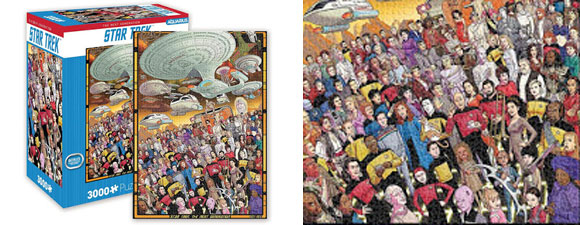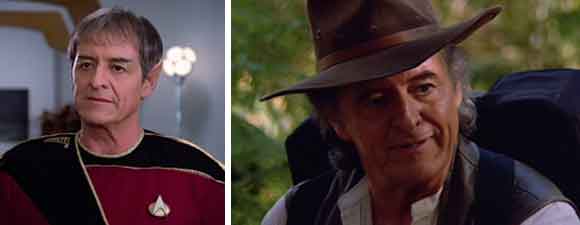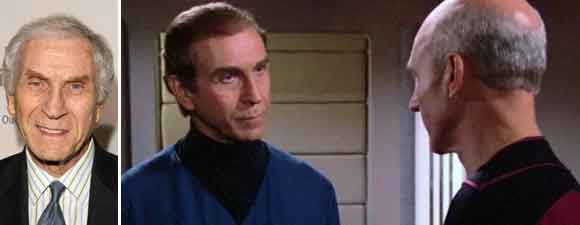Retro Review: Time’s Arrow, Part One
7 min readWhen archaeologists discover Data’s head buried under San Francisco, an investigation traps the android in the very era where he apparently lost his life.
Plot Summary: Starfleet orders the Enterprise to return to Earth, where archaeologists in San Francisco have discovered evidence of alien life on Earth in the late 1800s. A rare and dangerous form of energy, triolic waves, were apparently used in the city. When Picard asks why his ship in particular has been summoned to investigate, he and Data are shown Data’s decapitated head, which was found among the 19th century artifacts. Although Data finds it comforting to learn that he will eventually die, which makes him more human, the rest of the crew finds it very upsetting. LaForge believes the only aliens capable of using triolic waves on Earth live on Devidia II, so the Enterprise heads to that planet. Picard refuses to let Data join the away team, but when Troi senses human life despite an apparent absence of beings, Data realizes that the Devidians are out of phase with them temporally and insists that his positronic compiler represents the crew’s best hope for making contact with them. He beams down and vanishes as he shifts phases, but continues to communicate with the crew until some sort of unseen cataclysm tears him away. While the away team frantically tries to understand the connection between Data and the apparent invasion of 19th century Earth, Data finds himself in San Francisco in that era, where he sells his communicator badge, wins more money in a poker game, and begins to build a device to reach the Enterprise. Seeing a photo of Guinan in a local newspaper, he arrives uninvited at a literary reception where she and Mark Twain are both in attendance, but Guinan doesn’t recognize Data. When he explains that they serve on a starship together in the 24th century, she does not refute his claim that she is a member of a long-lived non-human species. Meanwhile, the Enterprise crew concludes that the Devidian interference in Earth history must be stopped and build a device so the away team can join Data. Picard does not intend to accompany them, but the Guinan of the 24th century warns him that if he does not, he will never meet her. The away team phase-shifts to see the Devidians absorbing the life force of dead humans, and the crew follows Picard through the Devidian portal to 19th century Earth.
Analysis: Star Trek’s incursions into human history have been wildly uneven – for every brilliant storyline like the original series’ “The City on the Edge of Forever,” which has an unforgettable device for getting the crew into the past as well as a moving drama about the dangers of meddling with the past, there’s an episode like Enterprise‘s “Storm Front,” where serious social and political themes disappear in a montage of mobsters, warplanes, explosions, gunfights, air raids, and Evil Alien Nazis. “Time’s Arrow, Part One” falls somewhere between those two installments in quality. It’s a reasonably entertaining hour of television, but the science is fuzzy at best, and if Data’s encounter with Mark Twain doesn’t drop to the absurd lows of Kirk meeting Abraham Lincoln, it doesn’t come close to the thrill of Janeway meeting Amelia Earhart, either. Nothing that happens after the brilliant opening – Data’s creepy encounter with his own severed head – comes close to that initial intensity, and the soul-sucking aliens who bring human energy back to feed their fellow Devidians seem more like a bad horror movie parody than something I’d expect to find on Star Trek.
Part of the problem for me is that the audience is repeatedly told how we’re supposed to feel when the episode hasn’t really earned those feelings. Sure, it’s horrifying to see Data’s lifeless eyes staring out of a non-functional head, but given that the head was found centuries before the series is set, it’s no more upsetting than if the crew had visited the grave of some beloved 20th century figure who’s no longer alive by the Next Gen era. I’m with Data: it’s a comfort to know that he won’t live forever, trying to understand human feelings about grief and loss while his friends die around him. We have no reason except television convention to believe that his death is imminent, so to have the crew walking around mournfully and Picard irrationally refusing to put Data on an away team almost seems a bit silly. LaForge, at least, seems more freaked out than miserable, though he needs to talk about his feelings with both Guinan and Data himself. Troi and Riker have a heart-to heart about feeling as though they have just learned their colleague has a terminal illness; when Data arrives at the turbolift, they fall so awkwardly silent that Data feels compelled to comment upon how differently everyone is treating him. It’s interesting social commentary on how people treat doomed friends, and particularly interesting since Data is not human – the feelings of the others are in no way diminished because it is cessation of function rather than death facing him. Yet Picard’s first question upon seeing the head is whether it could have belonged to the nearly-identical Lore, a reminder that Data may be in a unique position to survive his own body’s death. Since we now know that there is yet another Soong android, B-4, who will receive Data’s memories when Data’s body is eventually destroyed, it’s even harder to feel devastation over a not-yet-severed head.
The fun of the episode lies in the “City on the Edge”-type glimpse of old Earth, where Data tries to build a 24th century device out of stone knives and bearskins, and a sad old man dies at the hands of an alien weapon he will never understand. Everything looks too clean and newly constructed, but that’s a minor nitpick; the costumes and settings have all been lovingly reconstructed and beautifully lit, a dream of San Francisco in the prosperous post-gold-rush era. Data develops a delightful friendship with a bellboy who thinks the strange-looking man exemplifies the American Dream – someone who arrived in town in his pyjamas, won a nest egg in a poker game, and is about to turn it into a million dollars building an invention out of parts bought with those winnings. The bellboy wants a piece of that action – he’s been a fisherman and dock worker, and he’s sure he can make his ship come in if someone gives him an opportunity – so in the meantime, he does every job around the hotel not specifically assigned to someone else, and keeps his eyes open. In some ways he reminds me of Wesley Crusher, and I mean that in the very best sense.
There’s a lot of technobabble, and a lot of things that seem contradictory – Picard only lets Data beam down because Data says the only phase discriminator on the ship is in his positronic circuitry, for instance, but when Data disappears, it doesn’t take LaForge much time to put one together big enough for the entire away team with the help of Riker and Troi, neither of whom is an engineer. It makes very little sense that Data would be able to communicate through the temporal phase shift, but since he can, it would only make sense for the away team to have stationed someone back in the cavern monitoring whether it got through and what they’ve learned – Riker would be a good choice, so that all the senior officers aren’t risking death at once. Troi gets a lot of typical first-season stuff, screaming for Data, shuddering about humans suffering. Really, only Data has a particularly strong outing, since he manages to be quite funny on top of his existential dilemma; I love him warning the bellboy, who keeps coughing as a reminder that he hasn’t been tipped, that he should see a doctor since there’s a cholera epidemic in the city, and then pretending he hurt his arm after effortlessly picking up an anvil that the bellboy had struggled with.
The fifth season finale of The Next Generation is going to be held up for comparison not only to “The Best of Both Worlds, Part One,” but also “Redemption, Part One” and “Unification, Part One” which also aired during the fifth year – and while I’m sure for practical reasons it made sense to put the Spock-on-Romulus episode relatively early in the sequence, it would have made a far stronger conclusion to the season than “Time’s Arrow.” We don’t really worry Data will die, since he’s not dead heading into the cliffhanger (I think we’re all familiar with the ploy in which a character appears to be killed off at the end of the season so that the producers are in a stronger position to negotiate with the actor). And it’s a pretty safe bet that Earth’s history will be set straight – the fact that Guinan seems to know what’s coming, and doesn’t give Picard any particular advice, suggests it’s all a done deal in her mind. So the historical bits are amusing and there’s nothing horribly embarrassing, but there’s not a lot to praise mightily, either.






